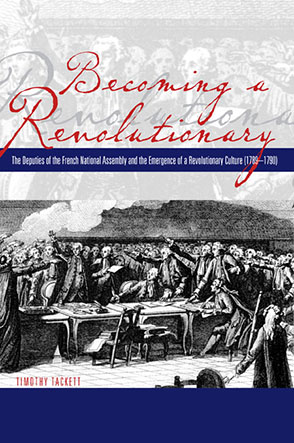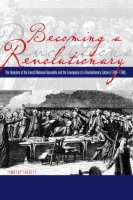
Becoming a Revolutionary
The Deputies of the French National Assembly and the Emergence of a Revolutionary Culture (1789–1790)
Timothy Tackett
Becoming a Revolutionary
The Deputies of the French National Assembly and the Emergence of a Revolutionary Culture (1789–1790)
Timothy Tackett
“Narratives abound of France’s first legislature, the Estates General of 1789, which became the Constituent Assembly of 1789–1791. None involve the detailed research that this coherent, collective biography of its total 1,315 deputies represents. Timothy Tackett has combed the public and private archives of France to find over 150 separate collections of deputies’ correspondence. . . . Tackett’s book is essential reading for anyone interested in the origins of that revolutionary France.”
- Media
- Description
- Reviews
- Bio
- Table of Contents
- Subjects
Winner of the 1998 Leo Gershoy Prize from the American Historical Association for the best book in Early Modern European History.
Timothy Tackett’s Becoming a Revolutionary revisits one of the most controversial moments in history: the beginning of the French Revolution. How did it arise? Why did French men and women become revolutionaries? To answer these questions, Tackett focuses on the experiences of the 1200 members of the first French National Assembly. Drawing upon on a wide range of sources, including contemporary letters and diaries, Tackett shows that the deputies were a group of practical men, whose ideas were governed more by concrete subjects than by abstract philosophy. Though it may seem surprising now, most of the deputies were actually in support of the king. Instead of being initiated as a result of a specific ideology founded on Enlightenment principles, the ideas that eventually led to the French Revolution were, instead, a direct result of the actual process of the Assembly.
First published in 1996 and hailed as an “exemplary product of the historian’s craft,” Becoming a Revolutionary is now available in paperback for the first time.
“Narratives abound of France’s first legislature, the Estates General of 1789, which became the Constituent Assembly of 1789–1791. None involve the detailed research that this coherent, collective biography of its total 1,315 deputies represents. Timothy Tackett has combed the public and private archives of France to find over 150 separate collections of deputies’ correspondence. . . . Tackett’s book is essential reading for anyone interested in the origins of that revolutionary France.”
“For two hundred years, historians have vigorously debated a basic enigma of the French Revolution: how a group of men without a preconceived goal, divided in their intentions as well as their backgrounds, managed to come together in an undertaking that ultimately led to the overthrow of the Old Regime. In this meticulously documented and convincingly argued study, Timothy Tackett has made a major contribution to this historical debate. . . . By his richly detailed charting of the transformations which occurred in the attitudes of these deputies, Tackett has provided valuable insight into how their reactions to the political contingencies and social interactions which they experienced ultimately turned them into revolutionaries.”
“This book is an exemplary product of the historian's craft, exhibiting a mastery of a vast array of sources, including some 57 public and private archives. Building on this evidential base, Tackett speaks to fundamental issues in the historiography of the French Revolution.”
“Timothy Tackett’s book is a critical intervention in the debate on the French revolution. It stands eloquent testimony to an emerging post-revisionist current, one that seeks to reveal the empirical inadequacy of the revisionist case.”
“A new book by Timothy Tackett is always one to be welcomed, for he is at once an able writer, a respected scholar, and a pioneer in the art of applying a new methodology to major problems in socio-political history. Moreover, in this book, which is as informative in detail as it is authoritative in substance, he brings his fresh approach to a particularly crucial question, that of the composition and character of the Constituent Assembly, the first national parliament of Revolutionary France.”
“By exhaustive and resourceful combing of archives and libraries throughout France, Tackett has unearthed far more evidence about the views of the members of the National Assembly than anybody before him. . . . In every sense, this book shows that, even on topics about which we thought we knew everything, the last word has not been said.”
“A major contribution to the history of the French Revolution.”
“Tackett reintroduces a social dimension to revolutionary politics. . . . His provocative book both challenges many of the ‘revisionist’ arguments and raises questions about the interpretation of the Revolution.”
Timothy Tackett is Professor of History at the University of California, Irvine. His most recent book is When the King Took Flight (2003).
CONTENTS
LIST OF ILLUSTRATIONS
ACKNOWLEDGMENTS
NOTE ON TRANSLATIONS
ABBREVIATIONS
INTRODUCTION
The Enigma of the Revolution
The Witnesses and Their Testimony
Prospectus
PART I: DEPUTY BACKGROUNDS
1. THE THREE ESTATES: A Collective Biography
Numbers and General Profile
The Clergy
The Nobility
The Third Estate
2. A Revolution of the Mind?
The Deputies and the Enlightenment
Deputy Publications before the Revolution
The Religious Culture of the Deputies
Ideology and Revolution
3. The Political Apprenticeship
Political Mobilization after 1770
The Municipal Mobilization of 1788-1789
Birth of the Aristocratic Party
The Electoral Assemblies of 1789
Third Opinion on the Eve of the Estates General
Noble Opinion on the Eve of the Estates General
PART II: ORIGINS OF THE REVOLUTIONARY DYNAMIC
4. The Creation of the National Assembly
Factional Formation in the Early Third Estate
The Clerical Estate and the Dominance of the Episcopacy
The Noble Estate and the Culture of Intransigence
The Breton Club and the Emergence of a Third Consensus
The Revolutionary Moment
5. The Experience of Revolution
The Deputies and the King
The Mid-July Crisis
Violence
The Night of August 4
6. Fractional Formation and the Revolutionary Dynamic:
August to November
The Conservative Offensive
The September Debates and the Limited Victory of the Right
The October Days: Break and Continuity
The Formation of the Jacobins
PART III: POLITICS AND REVOLUTION
7. The Deputies as Lawgivers
The Struggle for Self-Definition
Organizing the Assembly
Bureaus and Committees
Leadership and Oratory
Constituency Relations
8. Jacobins and Capuchins: The Revolutionary Dynamic through April 1790
The Deputy Outlook after October
Political Alignments at the Beginning of 1790
The Advance of the Left through February 1790
The Religious Question and the Abortive Resurgence of the Right
9. To End a Revolution
The King’s New Direction
Division of the Left and the Triumph of ’89
The Civil Constitution of the Clergy and the Suppression of the Nobility
Commemorating the Revolution: The Federation of 1790
CONCLUSION
APPENDIX I
Marriage Dowries of Deputies in Livres
APPENDIX II
Estimated Deputy Fortunes and Incomes in Livres at the End of the Old Regime
APPENDIX III
Leading Deputy Speakers during the National Assembly
SOURCES
INDEX
Mailing List
Subscribe to our mailing list and be notified about new titles, journals and catalogs.



